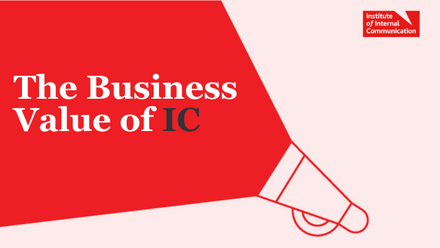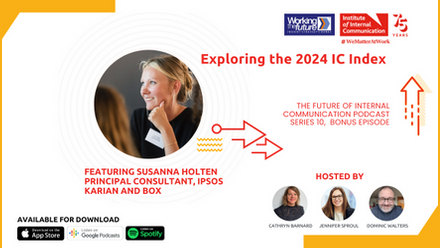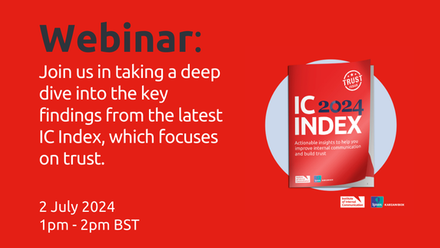In June, the IoIC published the second edition of its IC Index, produced in partnership with Ipsos Karian and Box. This important research explores the impact of internal communication on organisational performance and effectiveness.
This year’s data – based on the survey of 4,000 people working in the UK – reveals headline insights for internal communicators and highlights the critical role of trust at work in boosting morale, motivation, engagement and results.
The findings of the IC Index underscore the crucial role of internal communication within organisations, not least as they attempt to navigate increasingly complex operating environments and the continuous change that has already defined the tumultuous 2020s.
A key finding from this year’s Index is that belief in an organisation’s strategy is a key driver of trust.
In a previous article, we explored what trust is and why it’s so important for organisations hoping to survive current operating volatility to nurture environments that embed trust and integrity.
Why is a shared understanding of the business strategy important?
Multiple forces are placing increasing pressure on organisations to evolve and adapt. Next-generation technologies (including AI), the climate emergency, shifting attitudes towards employment and more are creating ever more ambiguous operating conditions. It’s imperative that organisations understand these shifts and undercurrents, to prepare, evolve and adapt.
For any organisation looking to thrive in the coming years, taking the time to make sure all internal stakeholders fully understand and align with the business strategy is mission-critical. Any misalignment poses a significant threat, undermining the organisation's ability to successfully respond to market forces. Situational awareness is key.
Yet the 2024 IC Index reveals only 69% feel their employer has been clear on what their business strategy is. While of course it’s great that so many are clear on the vision and direction of their business, that almost a third are unclear is worrisome.
Harvard Business School defines business strategy as the initiatives pursued to “create value for the organization (sic) and its stakeholders and gain a competitive advantage in the market”.
For organisations to perform optimally, every internal stakeholder needs to understand how their specific responsibilities fit within the wider delivery of organisational priorities. Only then can stakeholders feel an authentic sense of purpose and accomplishment. This is important. When people feel unable to fulfil their potential at work, it fuels disengagement. It also leads to higher staff turnover as people seek more satisfying career opportunities elsewhere.
The 2024 IC Index findings show that knowing how to contribute personally to the delivery of the organisational strategy is a key differentiator in engagement and performance. The research showed a 35-point difference between those that understand how their contribution feeds the strategy and those who don’t.
It’s clear a well-communicated, well-understood business strategy improves engagement and allows internal stakeholders to give their best at work. Indeed, strategic narrative was identified – and remains – one of four engagement enablers in ground-breaking UK-government commissioned research conducted by David MacLeod and Nita Clarke in 2008.
For internal communicators, this is a vital data point.
Not only is it mission-critical that organisations present a narrative that succinctly outlines the key business priorities, it’s also essential that each stakeholder understands the part they play in helping achieve them.
Furthermore, in increasingly uncertain operating environments, the strategy itself must be continuously modified to make sure it remains fit for purpose.
A clear and contextually relevant strategic narrative must be continuously communicated throughout the organisation so that all internal stakeholders understand their priorities and respond appropriately to new scenarios as they emerge.
When the strategy isn’t understood, trust diminishes
But the IC Index reveals another critical finding.
Only 56% of survey respondents believe their organisation’s strategy is the right one for success. This is worrying on two levels.
The first is that a lack of belief in an organisation’s strategy immediately undermines engagement and productivity. It invites languishing – a term that emerged in the post-lockdown months of 2022 and is defined as feeling a sense of stagnation and lack of motivation. In a work environment it’s synonymous with the rise of quiet quitting – doing the bare minimum to get by each day.
The second is the impact a lack of belief in the strategy has on the ability to trust those responsible for crafting the business strategy to do the right thing. In essence, the question becomes: if I don’t believe in the strategy, how can I believe in the competence of those leading my organisation?
But the data shows colleagues are far less likely to believe in the organisational strategy when they don’t know how they personally can contribute towards its execution. And this comes down to communication effectiveness – the extent to which each individual has had a conversation that links their work to organisational success. When internal stakeholders understand this, belief and trust in the strategy – and those leading the organisation – soars.
At a time when the UK economy faces significant challenges, lack of belief in either the business strategy or those leading the organisation has potentially disastrous ramifications. No organisation can afford a disengaged workforce in the current operating environment.
What can internal communicators do?
So – in light of these new insights – what can internal communicators do to improve things? There are several ways to deliver strategic value.
1. Make sure the business strategy is clear, accessible and easy to understand. This will involve working with senior stakeholders to craft messaging that communicates the core business priorities in a way that ALL contributors can buy into.
2. Make sure all stakeholders understand how they personally can help deliver the strategy. Once the core priorities have been identified, each stakeholder needs to understand how their personal activities fit into the wider objectives. This may entail small group gatherings to communicate the strategy, or working with line managers to make sure they feel equipped to share details of the priorities to their teams.
3. Make sure leaders are visible, accessible and available to both articulate the strategy and defend it when asked. We all need regular reminders of what we’re here to do – and frequent access to the executive team who clearly and concisely articulate (and re-articulate when recalibration is required) the strategy will help the wider organisation remain focused, engaged and on track.
4. Remind leaders of the requirement for a strategy that is robust enough to deliver on and, in parallel, flexible enough to adapt, as and when market forces demand it. All organisations need to remain vigilant and open to changes in market conditions. Awareness of the trends transforming commercial landscapes will help internal communicators deliver greater strategic input to their senior stakeholders.
5. Prioritise recognition. It sounds so simple but far too few people feel they get recognition at work. Recognition is a brilliant opportunity to boost goodwill and also reinforce the organisational strategy and individual alignment to it. Helping line managers and the wider business normalise recognising the accomplishments of internal stakeholders yields game-changing outcomes. Better still, it costs next to nothing.
Conclusion
We might wish for stability but it’s unlikely we will return to ‘normality’ anytime soon. There are too many convergent crises and it’s impossible to know how they will play out.
It’s never been more important for organisations to be clear on their strategy and to make sure all stakeholders understand it. Regardless of how many times the strategy might need revising, retaining clear and consistent lines of communication is essential. When we know what we’re here to do, we stand a chance of being able to deliver. When we don’t, we can’t.
How organisations communicate internally is strategically critical – and getting internal communication right has never been more important.






